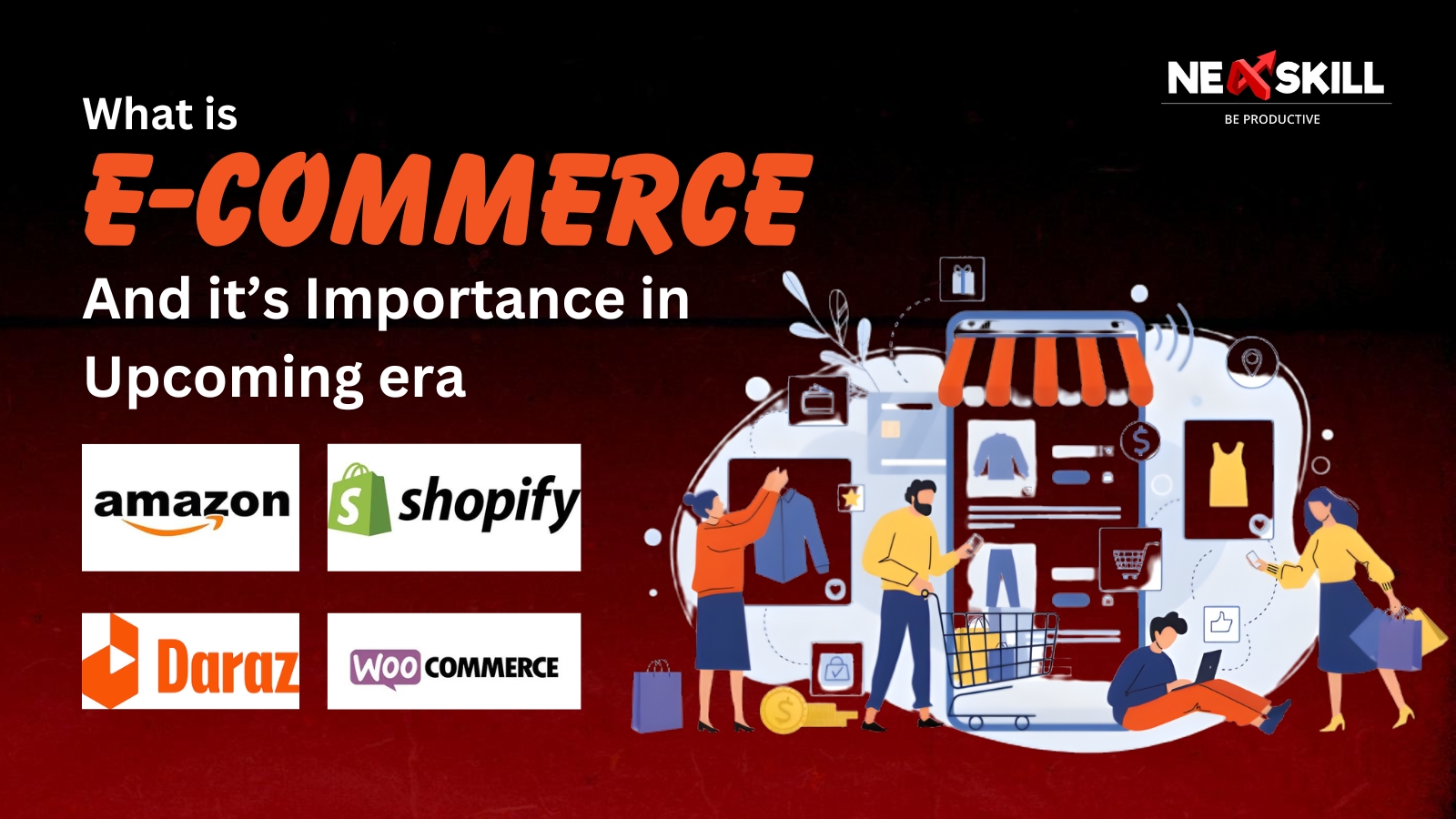
Introduction:
E-commerce refers to the buying and selling of goods or services entirely online. It encompasses a wide range of activities, from online retail stores to business-to-business transactions. It has become a transformative force in the way businesses operate and consumers shop, and its importance in the upcoming era is significant.
Types of E-commerce Transactions:
Its transactions can take various forms, including business-to-consumer (B2C), consumer-to-consumer (C2C), consumer-to-business (C2B), and business-to-business (B2B) transactions. Additionally, consumer-to-administration (C2A) transactions involve interactions between consumers and public administration or government bodies, such as social security, tax filing, and health services payments. So Mobile e-commerce (m-commerce) refers to online sales transactions using mobile devices, including mobile shopping, banking, and payments, facilitated by mobile chatbots .
Advantages and Disadvantages of E-commerce:
It offers unparalleled convenience, global reach, and cost efficiencies for businesses. It provides accessibility to customers, allowing them to shop conveniently from anywhere at any time. However, e-commerce companies also need to focus on security. So considering consumer data privacy and security, and data governance .
E-commerce Revenue Models:
E-commerce revenue models include drop shipping, where the seller does not keep goods in stock but instead transfers customer orders and shipment details to a manufacturer, wholesaler, or another retailer, who then ships the goods directly to the customer. So it has also impacted supply chain management, optimizing the physical flow, financial flow, and information flow within the supply chain .
E-commerce Statistics:
E-commerce has experienced substantial growth, with Amazon accounting for a significant portion of US retail its sales. The impact of e-commerce on buying and selling goods has undergone a substantial transformation following the advent of the internet. In the first quarter of 2023, retail e-commerce accounted for 15.1% of total sales in the United States, totaling roughly $272.6 billion .
E-commerce Compliance and Challenges:
It has expanded foreign sellers’ market access to the United States, but sellers may face challenges in complying with U.S. admissibility law. So the U.S. Customs and Border Protection has released a new E-Commerce Compliance Guide to help online sellers comply with basic import requirements. Additionally, CBP encourages awareness of counterfeits in it and the challenges associated with importing counterfeit goods .
In conclusion, e-commerce plays a pivotal role in the digital landscape, offering global reach, convenience, cost efficiencies, and transformative impacts on supply chain management. As technology continues to advance and consumer behaviors evolve. So it is set to play an increasingly vital role in the upcoming era.
E-commerce Importance in Upcoming era

E-commerce is poised to play a crucial role in the upcoming era for several reasons, as evidenced by various industry developments and trends.
1. Global Reach and Accessibility
It provides businesses with the ability to reach customers worldwide, transcending geographical boundaries. So this global reach opens up new opportunities for businesses to tap into emerging markets and connect with customers.
2. Adaptability and Resilience
The recent global pandemic has highlighted the importance of e-commerce as a resilient business model. During lockdowns and restrictions, physical stores faced significant challenges, while e-commerce thrived. Businesses with an established online presence were better equipped to continue operations and serve customers remotely.
3. Convenience and Personalization
It offers unparalleled convenience to both businesses and consumers. For consumers, the ability to browse and purchase products or services online from the comfort of their homes or on the go is a significant advantage. So E-commerce platforms provide intuitive user interfaces, personalized recommendations, and easy payment options, enhancing the overall shopping experience.
4. Cost Efficiency and Scalability
Compared to traditional brick-and-mortar stores, it offers cost efficiencies for businesses. Setting up an online store requires lower initial investment, and ongoing operational costs, such as rent and utilities, are significantly reduced. Additionally, it allows businesses to scale their operations more easily, enabling them to adapt to changing market demands.
5. Impact on Employment and Job Opportunities
It helps create new job opportunities due to information-related services, software apps, and digital products. It also causes job losses in certain sectors. The development of e-commerce will create jobs that require highly skilled workers to manage large amounts of information, customer demands, and production processes. So in contrast, people with poor technical skills may face challenges in enjoying the wages welfare .
E-commerce Platforms
E-commerce platforms play a crucial role in facilitating online transactions and managing digital storefronts. So here’s a comprehensive overview of some prominent e-commerce platforms, including Daraz, Shopify, Amazon, and Woo Commerce:
Daraz:

Daraz is a rapidly growing e-commerce platform in South Asia, operating in regions such as Bangladesh, Pakistan, Myanmar, Nepal, and Sri Lanka. It serves as a leading marketplace that empowers thousands of sellers to connect with millions of customers, offering various branded products for men and women across clothing, footwear, apparel, jewelry, and accessories. So the platform provides features for product category mapping, product operations (upload, update, inventory management), and order management, allowing seamless product management from WooCommerce to Daraz.
Shopify:

Shopify is a popular e-commerce platform that provides a comprehensive set of tools and features for businesses to create and manage their online stores. So it offers a user-friendly interface, customizable templates, and a range of built-in functionalities for catalog management, payment processing, and order fulfillment. Shopify’s competitors include both paid (Squarespace, Volusion) and free (WooCommerce, Magento) platforms. So WooCommerce and Magento are highlighted as potential alternatives for migrating from Shopify.
Amazon:

Amazon is a global e-commerce giant that operates as both a retail marketplace and a platform for third-party sellers. It provides a wide range of products across various categories and has a robust fulfillment network. Amazon’s marketplaces and integrations are essential for businesses looking to expand their reach and leverage the platform’s extensive customer base.
WooCommerce:

WooCommerce is a customizable, open-source e-commerce platform built on WordPress. It offers a range of features for businesses to create. And manage online stores, including product management, order processing, and payment integration. So WooCommerce is highlighted as a potential alternative for migrating from Shopify, providing similar features and capabilities.
Nexskill – Be Productive
Choosing the NeXskill – Be Productive e-commerce course can be advantageous for several reasons.
- The course aims to provide a comprehensive overview of the e-commerce industry, including how to choose a product for a successful e-commerce business . This ensures that you gain a solid understanding of the key concepts and strategies involved in running an e-commerce venture.
- NeXskill is a reputable educational platform that offers professional courses for job-seekers to learn job-ready skills . By enrolling in their course, you can benefit from their expertise and industry knowledge.
- The e-commerce industry offers rising opportunities, particularly for women. It provides flexibility and work-life balance, making it an attractive option for those seeking to run a business from home. The low entry threshold and the availability of free ecommerce tools make it accessible for self-employed women or female micro entrepreneurs . By acquiring the necessary skills through the NeXskill e-commerce course, you can tap into these opportunities and empower yourself in the digital marketplace.
- The course is designed to enhance your productivity and equip you with the skills needed to succeed in the this industry. NeXskill focuses on providing practical training and guidance, ensuring that you develop the necessary competencies to effectively manage an online store and drive sales .
- By joining the NeXskill community, you can benefit from networking opportunities and connect with professionals in the field. This can open doors to potential collaborations, mentorship, and future career prospects.
choosing the NeXskill – Be Productive e-commerce course can provide you with a comprehensive education, practical training, and networking opportunities, all of which are essential for success in the e-commerce industry.

